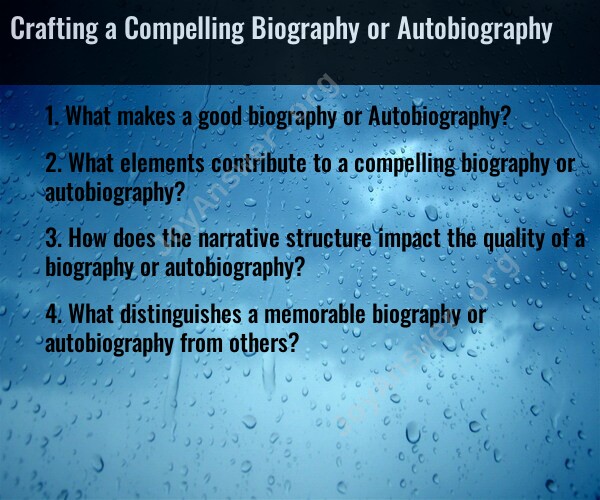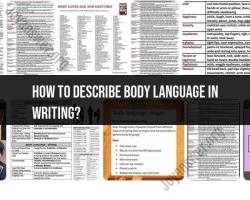What makes a good biography or Autobiography?
Crafting a compelling biography or autobiography involves a combination of storytelling skills, honesty, and a keen understanding of the subject's life. Here are key elements that contribute to making a good biography or autobiography:
Engaging Narrative:
- Develop a storytelling style that captivates the reader. Use vivid language, compelling anecdotes, and a narrative structure that keeps the audience interested from the beginning to the end.
Authentic Voice:
- Maintain an authentic voice that reflects the subject's personality or the author's own voice in the case of an autobiography. Readers connect more deeply when they feel the sincerity and genuine emotions behind the words.
Thematic Cohesion:
- Organize the narrative around key themes or milestones in the subject's life. This helps in creating a coherent and purposeful storyline rather than a mere chronological sequence of events.
Character Development:
- Develop the characters, including the central figure and important individuals in their life, with depth and nuance. Explore their motivations, struggles, and personal growth over time.
Personal Reflections:
- Include personal reflections and insights, especially in autobiographies. Readers appreciate the opportunity to understand the subject's thoughts, feelings, and perspectives on their own experiences.
Cultural and Historical Context:
- Provide context for the subject's life within the broader cultural and historical context. This helps readers understand the influences, challenges, and opportunities that shaped the individual.
Balanced Perspective:
- Present a balanced view of the subject, acknowledging both strengths and weaknesses. A nuanced portrayal adds depth and authenticity to the narrative.
Research and Accuracy:
- Conduct thorough research to ensure accuracy and credibility. Verify facts, dates, and events to present a reliable account of the subject's life.
Well-Defined Purpose:
- Clearly define the purpose of the biography or autobiography. Whether it's to inspire, inform, entertain, or reflect on specific themes, a well-defined purpose guides the narrative and resonates with readers.
Universal Themes:
- Explore universal themes that readers can relate to, such as love, loss, resilience, or personal growth. Connecting the subject's experiences to broader human experiences enhances the relevance and impact of the story.
Emotional Resonance:
- Elicit emotional responses from readers by conveying the highs and lows of the subject's journey. Emotional resonance helps create a memorable and impactful reading experience.
Attention to Detail:
- Pay attention to the small details that bring the narrative to life. Descriptive details about settings, personalities, and significant moments contribute to a vivid and immersive reading experience.
Closure and Resolution:
- Provide closure to the narrative, whether it's through a reflection on the subject's legacy, lessons learned, or the resolution of key story arcs. A well-crafted conclusion leaves a lasting impression.
Remember that each biography or autobiography is unique, reflecting the individuality of the subject or author. By combining these elements thoughtfully, writers can create a compelling and memorable portrayal of a person's life.
What elements contribute to a compelling biography or autobiography?
A compelling biography or autobiography is a captivating and insightful account of a person's life. It should be engaging, informative, and emotionally resonant, offering readers a unique perspective on the subject's experiences and their significance. Here are some key elements that contribute to a compelling biography or autobiography:
Strong narrative voice: The author's voice should be authentic, engaging, and consistent throughout the work. It should convey the subject's personality, emotions, and perspectives in a way that resonates with the reader.
Engaging storytelling: The story should be well-paced, with a clear beginning, middle, and end. It should incorporate vivid descriptions, anecdotes, and dialogue to bring the subject's life to life.
Honest and insightful reflections: The author should provide honest and insightful reflections on the subject's experiences, motivations, and challenges. This introspection allows readers to connect with the subject on a deeper level.
Universal themes and relevance: The subject's life story should connect to broader themes and experiences that resonate with readers on a universal level. This relatability makes the story more engaging and impactful.
Emotional resonance: The biography or autobiography should evoke emotions in the reader, making them feel empathy, joy, sadness, or other emotions as they connect with the subject's experiences.
How does the narrative structure impact the quality of a biography or autobiography?
Narrative structure plays a crucial role in the quality of a biography or autobiography. It provides the framework for organizing the subject's life story, shaping the reader's experience and understanding. Here are some ways in which narrative structure impacts the quality of a biography or autobiography:
Engaging the reader: A well-structured narrative can captivate the reader from the outset, keeping them engaged and invested in the story. This can be achieved through effective pacing, suspenseful plot points, and a clear progression of events.
Revealing the subject's character: The narrative structure can be used to reveal the subject's character, motivations, and growth over time. This can be achieved through careful selection of events, use of flashbacks or foreshadowing, and the juxtaposition of different perspectives.
Conveying themes and significance: The narrative structure can help convey the broader themes and significance of the subject's life story. This can be achieved through the arrangement of events, the use of symbolism, and the author's reflections throughout the narrative.
Memorable and impactful storytelling: A well-structured narrative can lead to a more memorable and impactful reading experience. It can leave a lasting impression on the reader, encouraging them to reflect on the story long after they finish reading.
What distinguishes a memorable biography or autobiography from others?
A memorable biography or autobiography stands out from others due to its unique combination of compelling storytelling, insightful reflections, and emotional resonance. It leaves a lasting impression on the reader, prompting them to ponder the subject's life and its broader significance. Here are some key characteristics that distinguish a memorable biography or autobiography:
Unique perspective and voice: The author's perspective and voice should be fresh, original, and insightful, offering a unique lens through which to view the subject's life. This originality can make the story more engaging and memorable.
In-depth exploration of themes: The biography or autobiography should delve into the themes that resonate with readers, exploring them in depth and providing new insights. This depth of exploration can make the story more thought-provoking and meaningful.
Emotional impact and connection: The story should evoke strong emotions in the reader, making them feel deeply connected to the subject's experiences. This emotional impact can make the story more memorable and impactful.
Enduring relevance and legacy: The biography or autobiography should have enduring relevance, continuing to resonate with readers long after its publication. It should explore themes and experiences that remain significant, leaving a lasting legacy.
Literary excellence and craftsmanship: The writing should be of high literary quality, demonstrating skill in storytelling, language usage, and narrative structure. This craftsmanship enhances the reader's experience and contributes to the story's memorability.












